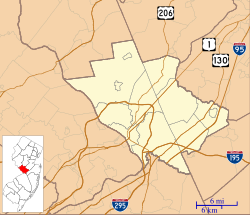Marquand Park
| Marquand Park | |
|---|---|
 |
|
| Location | Lovers Lane, Princeton, NJ |
| Created | 1846 |
| Founder | Allan Marquand |
| Designer | John Notman |
| Operated by | The Marquand Foundation |
| Species | Dawn redwood, Japanese Maple |
| Public transit access | Princeton Branch (The Dinky) |
| Website | marquandpark |
|
Marquand Park
|
|
| Coordinates | 40°20′29.4″N 74°40′16.1″W / 40.341500°N 74.671139°WCoordinates: 40°20′29.4″N 74°40′16.1″W / 40.341500°N 74.671139°W |
| Part of | Princeton Historic District (#75001143) |
| Added to NRHP | 27 June 1975 |
Marquand Park is a 17-acre (69,000 m2) arboretum and recreational area located in Princeton, New Jersey. It contains walking paths, a baseball field, and attractions for children such as a sandbox and a play structure.
Marquand Park was originally the property of the Princeton University professor Judge Richard Field, who bought 30 acres (120,000 m2) of farmland in 1842 for his personal estate. Fields and others began developing the land as an arboretum, and its development continued under Susan Brown, who acquired the land in 1871, and under Princeton University Professor Allan Marquand, who acquired the property in 1885.
In 1953, 17 acres (69,000 m2) of the land were given to Princeton borough by the Marquand family, and in 1955 a non-profit foundation was created to care for the park. Under the care of the Marquand Park Foundation, over 100 new species and trees of shrubs have been donated to the park or purchased by the foundation for it.
Eight of the largest trees of their species recorded in New Jersey can be found in the park. Other well-known trees there include a dawn redwood, a critically endangered species which was thought to be extinct until a specimen was discovered in Japan in 1945, and a threadleaf Japanese Maple, which is well known for the corkscrew-like shape of its trunk and branches. (Photographs of the Japanese Maple can be found here.)
...
Wikipedia



